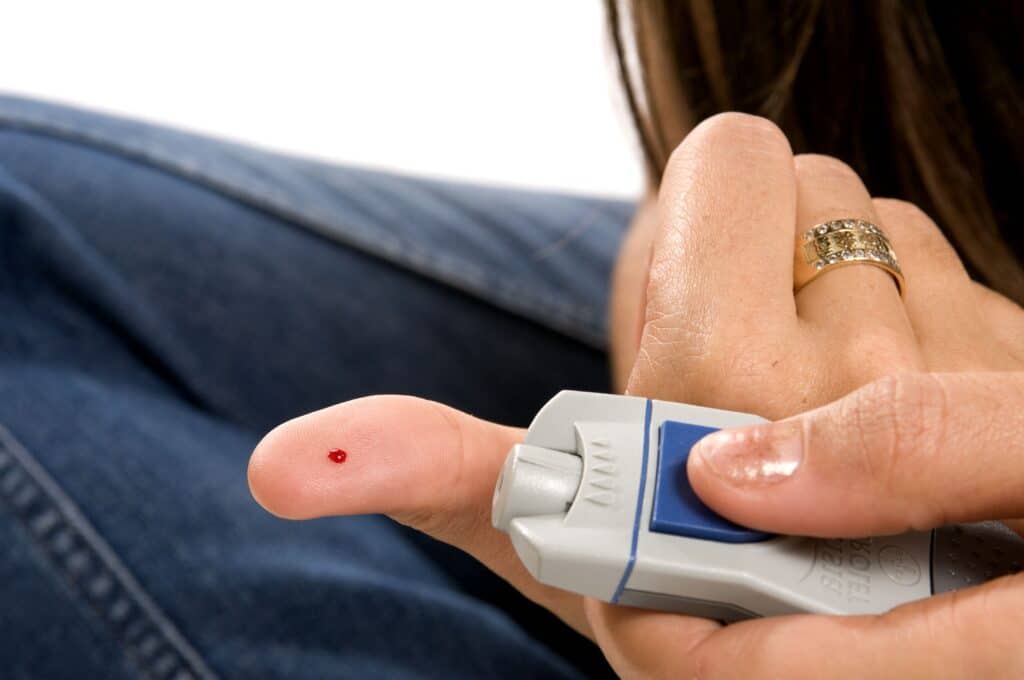Diabetes &
Blood Sugar Balance
Diabetes doesn't have to take over your life.

Diabetes can take a major toll on the body and overall wellness. People with diabetes often feel like they’ve been given a life sentence filled with medications and restrictions. Those at risk of developing diabetes may feel frozen, not knowing how to help themselves reverse what seems to be their fate.
Diabetes can be a daunting diagnosis, but it isn’t inevitable, and it doesn’t have to last forever. Understanding how the disease develops, what factors affect the disease, and what you can do about it gives you the best opportunity to feel and be healthy.
There are a lot of misconceptions about diabetes, who it strikes, and who is immune.
The truth is anyone can develop diabetes, but some factors make people more likely to be diagnosed with this health issue.
Diabetes risk factors include:
- DNA: If you are genetically predisposed to develop diabetes, you’re at a disadvantage. However, developing and maintaining a healthy lifestyle can be the difference between becoming a diabetic and the disease remaining dormant forever.
- Ethnicity: African American adults have an 80 percent higher risk of a diabetes diagnosis than non-Hispanic white adults. Hispanics, American Indians, and Asian-Americans also have a higher risk.
- Age: While your chances of developing diabetes grows with every year past your mid-40s, millions of diabetics and pre-diabetics are children and adolescents. Lifestyle has everything to do with risk.
- Weight: Obese and overweight individuals have a high risk of developing diabetes. Staying active is difficult for larger individuals, but remaining static leaves you in the danger zone.
- Diet and Nutrition: Poor dietary choices – what, when, and how you eat – mean your body isn’t getting the well-rounded nutrition it needs and can be the difference between developing diabetes and remaining unafflicted.
- Preexisting conditions: If you have other health problems like high blood pressure and low HDL levels, or if you have a history of gestational diabetes, diabetes may be more likely.
The problem with diabetes medications
Many diabetics are prescribed an array of medications to help manage their condition and address high blood glucose levels. Unfortunately, some prescriptions create more health problems. Diabetes sufferers often experience side effects like weight gain and swelling, high cholesterol and heart disease, gastrointestinal problems, and resistance to insulin.
Taking medication for diabetes management can feel like a tenuous lifeline – you want to keep your diabetes under control, but you don’t want to feel worse than you already do. You would love to eliminate the dependence on prescriptions, but you’re afraid of what will happen if you shun them for good.
What traditional medicine frequently fails to acknowledge is that diabetes meds are not a universal fit. A holistic approach, however, addresses the source of your diabetes with a regimen fine-tuned to your body and individual symptoms and needs. Lifestyle changes make the difference when it comes to combatting and controlling diabetes and minimizing your dependence on medications.

Comprehensive Blood Chemistry Analysis
The right testing can identify the root causes of each individual's blood sugar imbalance. This knowledge gives you the power to unravel the imbalance.

A customized program to manage or prevent diabetes
Programs include ultra-customized recommendations to help balance your blood sugar and avoid the spikes and crashes.

Nutrition & self-care are the great equalizers
Many clients find they are able to manage their blood sugar for the long-term without the need for medications.
Riding the rollercoaster of marshmallows for lunch
Justine ate marshmallows for lunch in college. She thought it was fine because they were fat free! We thought fat was the villain back then, and there was a fat free version of everything. She didn’t know then that we actually need healthy fats in our diet. She mistakenly believed that if you eat fat, you get fat.
What Justine didn’t realize at the time was the intense stress she was causing on her body. Because she was constantly trying to lose weight, she would wait as long as she possibly could to eat each day, but then when she did eat, it was all carbs and almost zero fats or proteins. Already pre-diabetic and experiencing several blood sugar symptoms, if she went too long between meals she would feel weak and shaky, nauseous, light-headed or dizzy, and sometimes get raging headaches so severe that she would end up having to go to the ER.
At the time, she had no idea that it was because she was riding a rollercoaster of blood sugar spiking high after a carb-heavy meal, and then sinking far too low between meals. Justine’s intense symptoms were her body’s way of screaming at her to get off this ride.
The amount of sugar that a person can tolerate in their blood at any given moment is a very specific range. If we consume too much sugar at once, our blood sugar rises. But then after the sugar is burned up, our blood sugar plummets. Each time glucose rises too high or falls too low, our body panics & adapts.
It responds to bring our blood sugar back into range by releasing cortisol, the stress hormone, or insulin, our glucose regulator. Cortisol release in response to stress consumes a tremendous amount of resources. It’s what gives us extra strength in times of emergency; it makes us more alert, more ready to fight off whatever danger is in our path at that very moment. And it raises our blood sugar. When this happens occasionally, the body responds and adapts beautifully. But when it happens repeatedly, day after day and year after year, both the adrenal glands and the hormones that regulate blood sugar begin to lose their ability to regulate glucose and keep it in right range. This is the beginning of diabetes.
There is a better way.
Your health is within your control, especially when you have the help and support of holistic digestive health specialists. At Ann Arbor Holistic Health in Ann Arbor, we encourage and empower our patients through education and targeted nutrition programs.
Identifying digestive disorders, autoimmune conditions, and hormone disorders is the first step to managing diabetes, delaying the onset of the disease, or preventing diabetes entirely. Fine-tuning your diet and lifestyle is the second step. You can live happily, eat well without depriving yourself, and control insulin surges. You are in charge of your life and diabetes is merely an arm of your existence.

Contact us today to schedule your comprehensive nutritional evaluation and consultation. We know you’re ready to feel better. Allow us the privilege of guiding you to wellness and a balanced and healthy existence.
If you are a diabetic, diabetes does not have to define you. Diabetes meds can manage some of your symptoms, but if you truly want to take charge of this disease, making major lifestyle changes is at the root of change.
Living with diabetes can be challenging. If you’re not digesting your food well, then you’re compounding the issue. Make the most of your nutrients and increase your energy and strength by improving your gut health.

